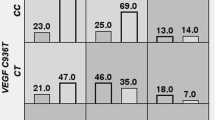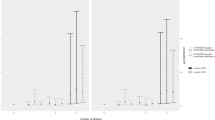Abstract
Objective
Carriage of thrombophilic and vasoactive polymorphic alleles has been associated with various pregnancy complications. The effect of carrying multiple polymorphisms is not known. We conducted a case-control study to determine the association between eight polymorphisms of thrombophilic and vasoactive genes and the risk of severe preeclampsia.
Methods
The following polymorphisms were analyzed by sequencing-on-chip-technology using solid-phase polymerase chain reaction on oligonucleotide microarrays: factor 5 (F5) Leiden, factor 2 (F2)-prothrombin G20210A, plasminogen activator inhibitor (PAI)-1 4G/5G, nitric oxide synthase (NOS) 3 T768C, NOS 3 Glu298Asp, angiotensinogen (AGT) Met235Thr, estrogen receptor (ER) alpha Pvu II, and mineralcorticoid receptor (MLR) Ser810Leu. The study comprised 24 patients with severe preeclampsia and 24 controls from a cohort of consecutive white women treated at the Obstetrics Department of the University of Vienna Medical School. Genotypes were correlated with clinical data.
Results
The investigated polymorphisms did not influence the risk of severe preeclampsia independently. When separately considering the simultaneous carriage of multiple thrombophilic or vasoactive polymorphisms, neither the combined carriage of thrombophilic polymorphisms (F5 Leiden, F2 G20210A, PAI-1 4G/5G), nor the combined carriage of vasoactive polymorphisms (NOS 3 T768C, NOS 3 Glu298Asp, AGT Met235Thr) conferred an increased risk of severe preeclampsia. Cumulative genotype frequencies f or at least two homozygous mutant genotypes, however, were nine of 24 (38%) and two of 24 (8%) for the study and control groups, respectively (P <.05). All of these nine women with severe preeclampsia had at least two homozygous mutant genotypes of four polymorphisms, ie, F5 Leiden, NOS 3 T768C, NOS 3 Glu298Asp, or ER alpha Pvu II.
Conclusion
Our data fail to document an independent significant influence of the investigated polymorphisms on the risk of severe preeclampsia. In an attempt to build a multigenetic model of severe preeclampsia, the combination of F5 Leiden, NOS 3 T768C, NOS 3 Glu298Asp, and ER alpha Pvu II was the most effective combination to predict the presence of severe preeclampsia in this small series of white women.
Similar content being viewed by others
References
Shastry BS. SNP alleles in human disease and evolution. J Hum Genet 2002;47:561–6.
Evans WE, McLeod HL. Pharmacogenomics-drug disposition, drug targets, and side effects. N Engl J Med 2003;348:538–49.
Khoury MJ, McCabe LL, McCabe ER. Population screening in the age of genomic medicine. N Engl J Med 2003;348:50–8.
Li WH, Gu Z, Wang H, Nekrutenko A. Evolutionary analyses of the human genome. Nature 2001;409:847–9.
Rey E, Kahn SR, David M, Shrier L. Thrombophilic disorders and fetal loss: A meta-analysis. Lancet 2003;361(9361):901–8.
Adelberg AM, Kuiler JA. Thrombophilias and recurrent miscarriage. Obstet Gynecol Surv 2002;57(10):703–9.
Glueck CJ, Kupferminc MJ, Fontaine RN, Wang P, Weksler BB, Eldor A. Genetic hypofibrinolysis in complicated pregnancies. Obstet Gynecol 2001;97(1):44–8.
Zhang XQ, Varner M, Dizon-Townson D, Song F, Ward K. A molecular variant of angiotensinogen is associated with intrauterine growth restriction. Obstet Gynecol 2003; 101 (2):237–42.
Tempfer CB, Dorman K, Deter RI, O’Brien WE, Gregg AR. An endothelial nitric oxide synthase gene polymorphism is associated with preeclampsia. Hypertens Pregnancy 2001;20(1):107–18.
Morrison ER, Miedzybrodzka ZH, Campbell DM, et al. Pro-thrombotic genotypes are not associated with pre-eclampsia and gestational hypertension: Results from a large population-based study and systematic review. Thromb Haemost 2002;87(5):779–85.
Infante-Rivard C, Rivard GE, Yotov WV, et al. Absence of association of thrombophilia polymorphisms with intrauterine growth restriction. N Engl J Med 2002;347(1):19–25.
Endler G, Mannhalter C. Polymorphisms in coagulation factor genes and their impact on arterial and venous thrombosis. Clin Chim Acta 2003;330(1-2):31–55.
Chesley LC, Cosgrove RA, Annito JE. Pregnancy in the sisters and daughters of eclamptic women. Path Microbiol 1961;24: 662–6.
Dawson LM, Parfrey PS, Hefferton D, et al. Familial risk of preeclampsia in Newfoundland: A population-based study. J Am Soc Nephrol 2002; 13(7):1901–6.
Esplin MS, Fausett MB, Fraser A, et al. Paternal and maternal components of the predisposition to preeclampsia. N Engl J Med 2001;344(12):867–72.
American College of Obstetricians and Gynecologists. Diagnosis and management of preeclampsia and eclampsia. ACOG practice bulletin no. 33. Washington DC: American College of Obstetricians and Gynecologists, 2002.
Huber M, Mundlein A, Domstauder E, et al. Accessing single nucleotide polymorphisms in genomic DNA by direct multiplex polymerase chain reaction amplification on oligonucleotide mi-croarrays. Anal Biochem 2002;303:25–33.
Guo Z, Guilfoyle RA, Thiel AJ, Wang R, Smith LM. Direct fluorescence analysis of genetic polymorphisms by hybridization with oligonucleotide arrays on glass supports. Nucleic Acids Res 1994;22:5456–65.
Wallace RB, Shaffer J, Murphy RF, Bonner J, Hirose T, Itakura K. Hybridization of synthetic oligodeoxyribonucleotides to phi chi 174 DNA: The effect of single base pair mismatch. Nucleic Acids Res 1979;6:3543–57.
Baudin B. Angiotensin II receptor polymorphisms in hypertension. Pharmacogenomic considerations. Pharmacogenomics 2002;3(1):65–73.
Geiler DS. A mineralocorticoid receptor mutation causing human hypertension. Curr Opin Nephrol Hypertens 2001; 10(5): 661–5.
Benedetto C, Marozio L, Salton L, Maula V, Chieppa G, Massobrio M. Factor V. Leiden and factor II G20210A in preeclampsia and HELLP syndrome. Acta Obstet Gynecol Scand 2002; 81(12):1095–100.
Kobashi G, Yamada H, Ohta K, Kato E, Ebina Y, Fujimoto S. Endothelial nitric oxide synthase gene (NOS3) variant and hypertension in pregnancy. Am J Med Genet 2001;103(3):241–4.
Author information
Authors and Affiliations
Corresponding author
Rights and permissions
About this article
Cite this article
Tempfer, C.B., Jirecek, S., Riener, EK. et al. Polymorphisms of Thrombophilic and Vasoactive Genes and Severe Preeclampsia: A Pilot Study. Reprod. Sci. 11, 227–231 (2004). https://doi.org/10.1016/j.jsgi.2003.12.002
Published:
Issue Date:
DOI: https://doi.org/10.1016/j.jsgi.2003.12.002




